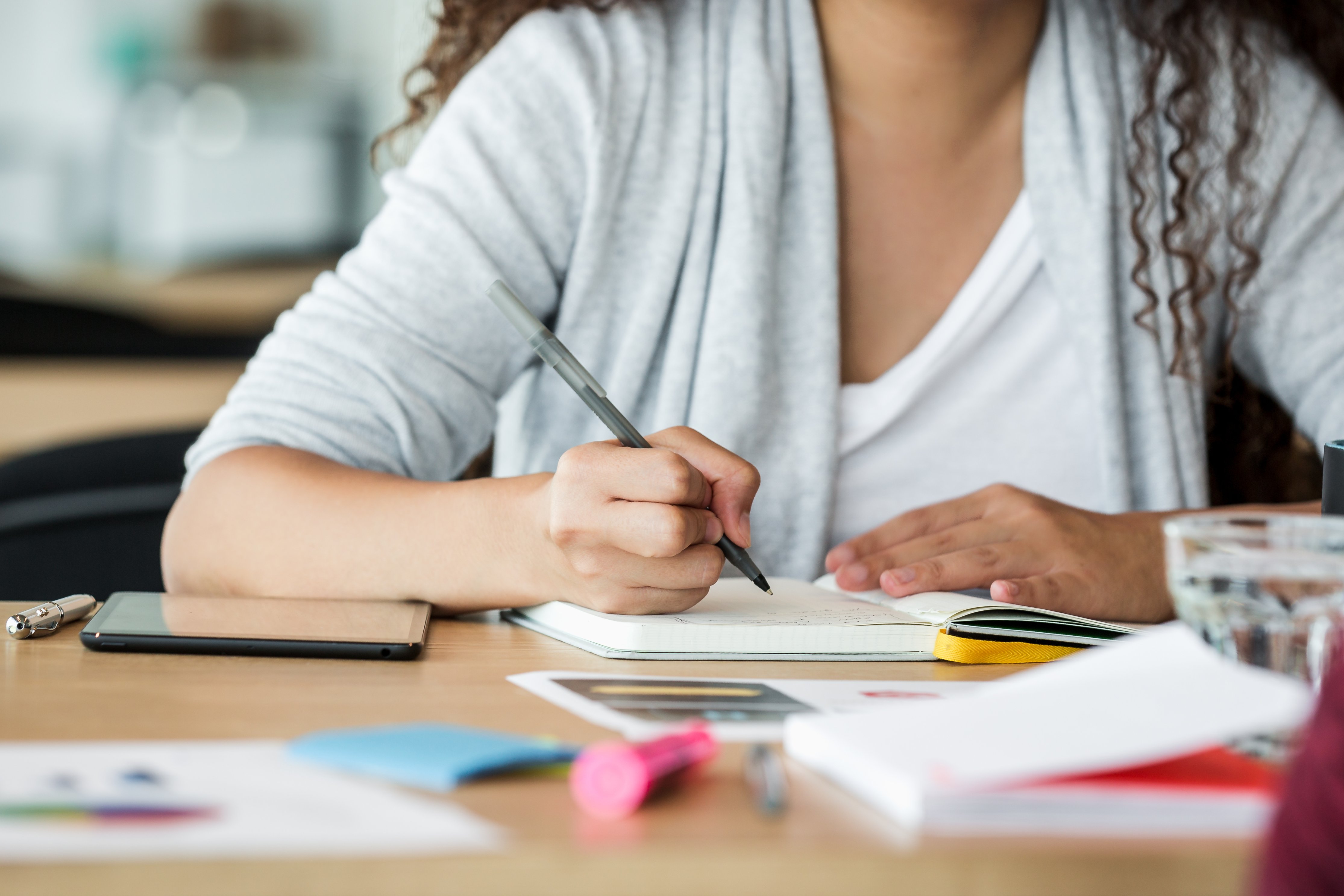Final exams can have a major impact on students’ overall grades!
It’s not uncommon for a final exam to be worth 25 or even 30% of students’ overall grade for a course. This one test can have as much of an impact on students’ grades as ALL of the homework assignments they have completed throughout the entire semester…combined!
Unfortunately, most students have never learned how to study effectively for exams. Studies suggest that most college students have a poor understanding of which study tactics are most effective, and routinely prepare for tests using inefficient learning strategies. So even when students think they’re studying effectively, the methods they’re using are actually not as useful as they believe.
Here are 10 common mistakes students make when studying for exams:
1. Not knowing the grades you’re aiming for
If students don’t know what score they need to earn on each of their final exams in order to get the grades they want in their classes, how can they know which exams are most important to study for? Yes, in an ideal world, they would study everything for every class, and get 100% on all of their exams. But in reality, they have a limited amount of time to work with, so it makes sense to spend more time studying for the classes in which their grade on the exam is more important — either because it is worth more of their overall grade, or because they need a good score on the exam in order to pull up their average to the grade they want.
2. Relying on their teachers to prepare them
Many students assume that they will be prepared for the test as long as they attend class, attend the teachers’ exam review sessions, and look over the study guides teachers have provided. The materials their teacher provides are a great clue about what they think is important to know for the exam, so they can be a great starting place, but just being present for the review sessions and looking over the study guide is not enough to guarantee that a student will do well on the exam. If they really want to do well, students needs to take responsibility for ensuring that they truly understand the material.
3. Not starting early enough
While many students intend to begin studying for final exams a couple of weeks beforehand, that timeline often slips as exams approach. After several days of convincing themselves “it will be okay to skip this one day and get started tomorrow,” suddenly what was supposed to be a week of studying turns into one or two frantic nights of cramming. Studying for exams often takes more time than students might anticipate, so they should get started early.
4. Studying in chronological (rather than priority) order
One common approach to studying for exams is to sit down and look through all of the notes from class in chronological order. In addition to being a very passive study strategy (more on this below), it also puts students at risk of running out of time to review the material they learned most recently, which is often emphasized more heavily on the final exam and can also be some of the most difficult concepts to master – especially for classes like math and languages that increase in difficulty throughout the semester. Instead of studying in chronological order, students should try studying in priority order, spending the majority of their time on the information that will be most important for them to know for the test.
5. Using passive study strategies
The most common study method most students use is reading over their notes from class. Unfortunately, this approach to studying is not very effective, in large part because it is extremely passive. I’ve found that students who use this approach will readily admit that they can read over a page of notes and not remember what they have just read! If they don’t remember it right after they’ve read it, how could they possibly hope to answer questions about it on the test? Choosing more active study strategies that require them to engage with the material will enable them to learn the material more effectively and efficiently.
6. Not testing themselves on the material
Practice testing (what researchers call “active recall”) is the most effective way for students to prepare for tests. Numerous studies have shown that students who test themselves on the material are learning and remembering the information better than students who do not take practice tests. Practice testing also helps students avoid “illusions of competence”: situations in which they think they know the information better than they do. Unfortunately, many students spend much more time reviewing their notes than they do taking practice tests. Our coaches strongly recommend students test themselves on the information they’re studying as frequently as possible, both to enhance their memory and to confirm that they have actually learned it.

7. Practicing in the wrong format (not how they’ll be tested)
As coaches, we often find that students will study the same way for all of their exams, regardless of the format. For example, they might study for history by making flashcards for all the key terms in their notes. This might be a great strategy for a test that is mostly multiple choice and matching questions…but it could get them intro trouble if their test is mostly short answer and essay questions that require them to answer “why” and “how” questions about the bigger-picture concepts from the class. If students want to be prepared for their exams, they need to make sure that the way they’re studying for their test is similar to the way they will actually be tested on the material.
8. Reviewing information they already know
Even when students are testing themselves and using active study strategies, they often spend the majority of their time on topics they already know. Doing problems they’re familiar with and know how to solve is more comfortable, and gives students a nice boost in their self-confidence. The issue with this approach is that they often end up running out of time to work through the challenging problems that they don’t know how to solve…and those are the ones that they end up missing on the test. Once they’ve confirmed that they understand and can answer questions about a certain concept, they should check it off their list and move on to something more challenging.
9. Memorizing, rather than understanding
We frequently see students who have been studying by trying to memorize all of the facts from a class, rather than truly understanding the underlying concepts. Memorizing can work well in some classes, especially in elementary and middle school, but it often backfires in more advanced classes. If they’ve memorized a definition but don’t really understand what it means, then as soon as the information is presented in a slightly different format, or they’re asked to apply it to a new type of problem, they will have no idea how to proceed. Rather than memorizing the information from their classes, students should use study strategies that encourage them to understand the concepts. Explaining ideas out loud in their own words, or teaching them to someone else, are great examples of study strategies that promote understanding.
10. Not having a PLAN!
One of the biggest mistakes we see students make is that they’ll often sit down and start “studying” without really knowing what their priorities are, what they need to focus on in that study session, or which study strategies they’re going to use to master the material. This might be the biggest mistake of all, because it affects all of the others! If they don’t know what grades they need to earn, what material is most important for them to learn, or how to study it effectively so the information sticks in their brain, chances are good that students will spend a lot of time spinning their wheels (or getting distracted), and end up going into the exam far less prepared than they could have been.
Your Turn!
Do any of these mistakes sound familiar to you? Which do you think you could work on the next time you have to study for an exam?
Parents
Which of these mistakes do you remember making when you were a student? If your student could work on improving in one of these areas, which one do you think would have the biggest impact for them? If you think an academic coach would be helpful to guide your student as they study for their next exam, sign up for a free consultation here!
Citations
McCabe, J. (2011). Metacognitive awareness of learning strategies in undergraduates. Memory & Cognition, 39(3), 462-476.
Karpicke, J. D., & Blunt, J. R. (2011). Retrieval practice produces more learning than elaborative studying with concept mapping. Science, 331(6018), 772-775.

Join 11,000+ parents helping their students earn better grades with less stress!

About The Author
Dr. Maggie Wray is a certified ADHD Coach & Academic Life Coach with a Ph.D. in Neurobiology and Behavior from Cornell and a Bachelor’s degree in Astrophysics from Princeton. She founded Creating Positive Futures in 2012 to help high school and college students learn how to earn better grades with less stress. Her team of dedicated coaches is on a mission to empower students to develop the mindset, organization, time management, and study skills they need to achieve their goals.
Related Posts
Other Posts You May Enjoy
How Does Your Teen Handle Failure?
How do you feel about failure?Most of us aren’t crazy about it. But at some point, no matter how hard we try, we’re going to fail at something. So, it’s important to consider how to respond to failure when it does happen, and how to improve our resilience so we’re...
Optimistic students earn better grades
Is your student more of an optimist, or a pessimist? Studies have shown that optimists experience a number of benefits later in life, as compared with their more pessimistic peers, including… Better test scores and higher GPAs Lower levels of stress, anxiety, and...
Starting before you’re motivated
Most students want to do well in school. But wanting to do well doesn't guarantee they will feel motivated to work on assignments in the moment. Even students who usually get good grades have days when they just don’t feel like doing homework or studying for their...




